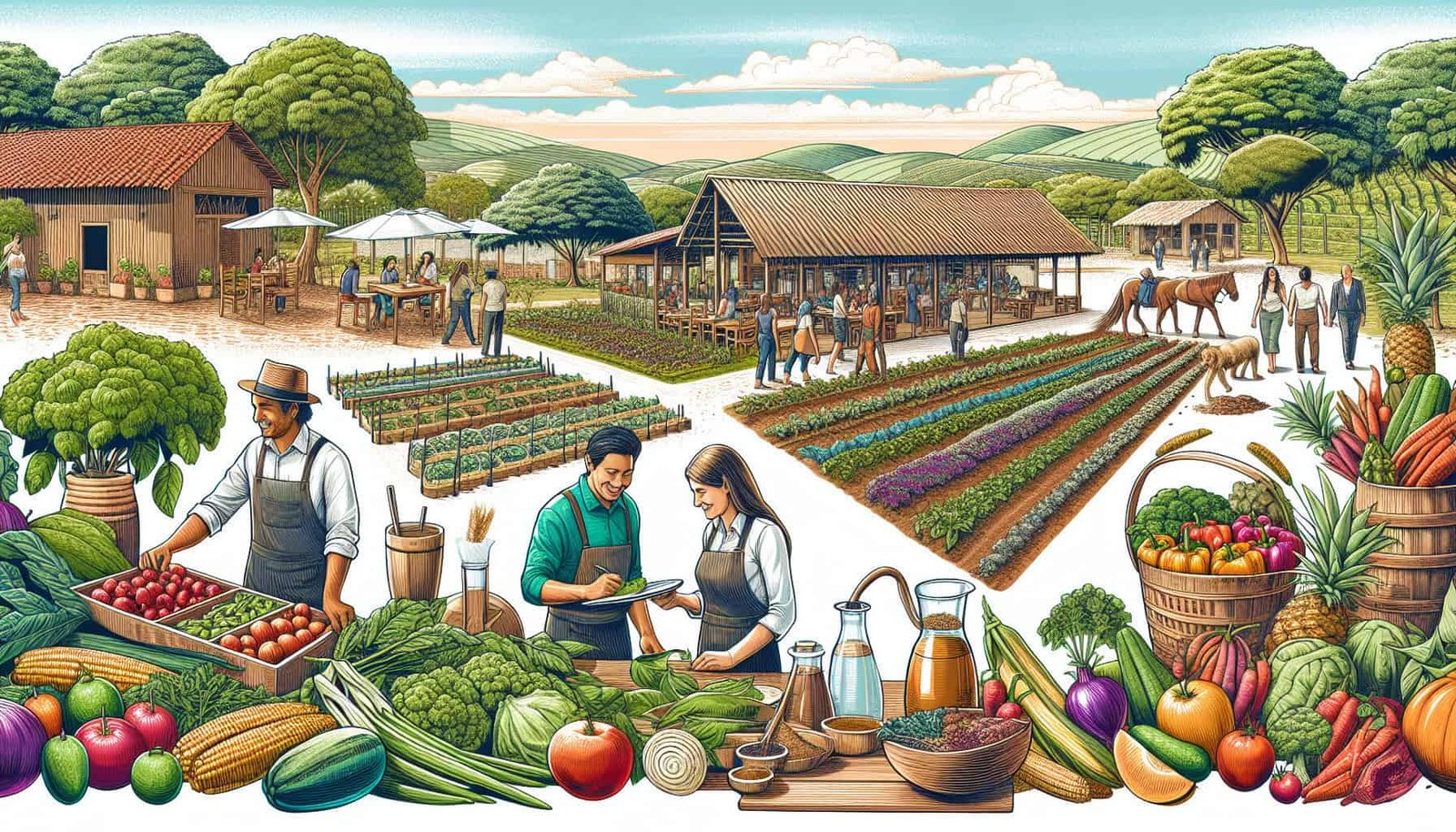Nicaragua, with its rich agricultural heritage and diverse culinary scene, offers a plethora of options for those seeking a true farm-to-table dining experience. From quaint countryside eateries to bustling city restaurants, you will find an array of establishments that pride themselves on serving fresh, locally sourced ingredients. Whether you’re looking to savor traditional Nicaraguan cuisine or indulge in international flavors with a local twist, this article will guide you through the various dining options available in Nicaragua’s farm-to-table scene. Prepare your taste buds for a journey of flavors, as we explore the best ways to indulge in the vibrant food culture of this Central American gem.
1. Introduction to Farm-to-Table Dining in Nicaragua
In recent years, farm-to-table dining has gained popularity worldwide, including in Nicaragua. This culinary concept emphasizes the use of locally sourced, fresh ingredients directly from the farm to create delicious and healthy dishes. Farm-to-table dining not only supports local farmers and communities but also provides consumers with a unique dining experience that connects them to the land and the food they consume.
1.1 Farm-to-Table Concept Explained
The farm-to-table concept revolves around the idea of minimizing the distance between the farm or food source and the table. It prioritizes the use of seasonal, organic, and locally grown produce, meats, and seafood to create flavorful and nutritious meals. By eliminating the intermediaries and sourcing directly from local farmers, chefs can ensure the quality and traceability of the ingredients, as well as support sustainable agricultural practices.
1.2 Growing Trend in Nicaragua
Nicaragua is experiencing a growing trend of farm-to-table dining as more restaurants and consumers recognize the benefits of consuming locally sourced food. The country’s diverse agricultural landscape and fertile soil make it an ideal location for organic farming. Nicaraguan farmers have embraced sustainable and regenerative farming practices, producing a wide variety of crops such as coffee, cacao, fruits, vegetables, and spices.
2. Organic Farms and Restaurants
2.1 Organic Farms in Nicaragua
Nicaragua boasts a range of organic farms that prioritize sustainable agricultural practices and offer visitors a chance to explore their operations. These farms cultivate a diverse array of crops without the use of synthetic pesticides or genetically modified organisms. Some well-known organic farms in Nicaragua include Finca Esperanza Verde, which specializes in coffee production, and Mombacho Cigars, which grows tobacco sustainably for its handmade cigars.
2.2 Farm-Driven Restaurants
To complement the abundance of organic farms, farm-driven restaurants have emerged across Nicaragua. These restaurants forge direct partnerships with local farmers, ensuring their ingredients are fresh and of the highest quality. With ever-changing menus based on what is in season, farm-driven restaurants celebrate the flavors and culinary traditions of Nicaragua while minimizing their carbon footprint. Some notable farm-driven restaurants in Nicaragua are La Finca y el Mar in Granada and El Colibri in Managua.

3. Agrotourism and Farm Stays
3.1 Experiencing Farm Life
Agrotourism provides an immersive experience for those seeking to connect with nature and gain insights into the farming lifestyle in Nicaragua. Farm stays offer opportunities to work alongside farmers, participate in daily farm activities, and taste the bountiful harvest. From milking cows and harvesting crops to making cheese and tending to farm animals, visitors can fully immerse themselves in farm life and appreciate the hard work that goes into producing the food they enjoy.
3.2 Learning Through Agrotourism
Agrotourism in Nicaragua goes beyond just hands-on experiences. Many farms offer educational programs and workshops that allow visitors to learn about sustainable farming techniques, traditional agricultural practices, and the importance of biodiversity. These programs cater to individuals, families, and even school groups, providing a valuable learning experience and fostering a deeper understanding of the agricultural heritage in Nicaragua.
4. Community Supported Agriculture (CSA) Programs
4.1 Supporting Local Farmers
Community Supported Agriculture (CSA) programs have gained traction in Nicaragua, allowing residents and visitors to directly support local farmers and receive fresh produce in return. Participants can join a CSA program by purchasing a share of the farm’s harvest, which provides farmers with upfront funds to cover operating expenses. In return, members receive a weekly or bi-weekly share of freshly harvested, nutrient-rich fruits, vegetables, and herbs.
4.2 Direct Access to Fresh Produce
CSA programs in Nicaragua offer the unique advantage of accessing locally grown, organic produce. Members can enjoy a diverse range of seasonal fruits and vegetables that are picked at the peak of freshness, enhancing the taste and nutritional value of their meals. Additionally, CSA programs often foster a sense of community by organizing pickup events or even farm visits, allowing members to meet the farmers and witness the process from field to table.
4.3 CSA Programs in Nicaragua
In Nicaragua, several CSA programs provide individuals and families with the opportunity to support sustainable agriculture while enjoying fresh produce. Examples include the CSA program offered by Finca Neblina del Bosque, which delivers organic fruits and vegetables to customers’ doorsteps in Granada, and the CSA program at El Porvenir Farm, which focuses on heirloom vegetables and herbs.

5. Farmers’ Markets and Local Produce
5.1 Vibrant Farmers’ Markets
Farmers’ markets in Nicaragua are vibrant hubs of local produce, where farmers gather to sell their freshly harvested goods directly to consumers. These markets showcase the diverse array of fruits, vegetables, meats, cheeses, and homemade products that can be found across the country. Visitors can stroll through the colorful stalls, engage with the farmers, and select the finest ingredients for their farm-to-table meals.
5.2 Direct Purchase from Farmers
By purchasing directly from farmers at the markets, you can be assured of the freshness and quality of the produce. This direct connection allows for transparency and fosters a sense of community between consumers and farmers. It also provides an opportunity to learn about the growing practices, seasonal availability, and unique flavors of Nicaraguan produce.
6. Culinary Tours and Cooking Classes
6.1 Exploring Nicaraguan Cuisine
Culinary tours and cooking classes offer a delightful way to explore the flavors and cultural heritage of Nicaraguan cuisine. These experiences take you on a journey through local markets, where you can select fresh ingredients, and guide you through the process of preparing traditional dishes. From mouthwatering gallo pinto, a staple Nicaraguan rice and beans dish, to indulgent vigorón, a combination of yuca, pork rinds, and cabbage slaw, you can immerse yourself in the vibrant and diverse flavors of Nicaragua.
6.2 Hands-On Cooking Experiences
Cooking classes provide hands-on experiences that allow you to learn from skilled local chefs. Whether it’s kneading dough for corn tortillas, mastering the art of making ceviche with freshly caught seafood, or discovering the intricate flavors of traditional desserts, you will gain valuable insights into Nicaraguan culinary traditions. These classes often feature farm-to-table components, emphasizing the use of local and organic ingredients, and empower you to recreate the flavors of Nicaragua in your own kitchen.

7. Sustainable Seafood Options
7.1 Fresh Seafood from Local Fishermen
With its stunning coastline along the Pacific Ocean and the Caribbean Sea, Nicaragua offers a wealth of sustainable seafood options. Local fishermen utilize responsible fishing practices, ensuring that the marine ecosystem is protected and fish populations are preserved. From succulent lobster and shrimp to flavorful fish varieties like red snapper and mahi-mahi, you can enjoy the freshest catch while supporting the livelihoods of coastal communities.
7.2 Responsible Fishing Practices
Responsible fishing practices in Nicaragua focus on sustainable techniques such as handline fishing and the use of selective fishing gear. These methods minimize bycatch and help maintain the delicate balance of marine life. Many seafood restaurants in Nicaragua proudly source their seafood from local fishermen who adhere to these sustainable practices, allowing you to indulge in delectable seafood dishes with a clear conscience.
8. Indigenous Food Experiences
8.1 Traditional Indigenous Dishes
Nicaragua is home to various indigenous communities that have preserved their unique culinary traditions over centuries. Experiencing indigenous food allows you to delve into the rich cultural heritage of Nicaragua and appreciate the flavors passed down through generations. Traditional dishes like nacatamales, made with maize dough and filled with seasoned meat and vegetables, or indio viejo, a hearty stew made with cornmeal and meat, offer a captivating fusion of flavors and ingredients.
8.2 Learning from Indigenous Communities
Engaging with indigenous communities provides an opportunity to learn directly from the experts about their traditional farming and culinary practices. Many indigenous communities offer cultural tours, where visitors can participate in harvesting indigenous crops, learn about ancestral farming techniques, and prepare traditional meals alongside community members. These unique experiences foster cultural exchange, mutual respect, and a deeper understanding of the indigenous foodways in Nicaragua.

9. Volunteering on Organic Farms
9.1 Educational and Volunteer Opportunities
For those looking to make a meaningful contribution to sustainable agriculture in Nicaragua, volunteering on organic farms offers an enriching experience. Many organic farms welcome volunteers to assist with various tasks, including planting, weeding, harvesting, and composting. These educational opportunities allow you to learn firsthand about organic farming practices, gain new skills, and contribute to the local food system.
9.2 Supporting Sustainable Agriculture
By volunteering on organic farms, you directly support and promote sustainable agriculture in Nicaragua. Your efforts help farmers implement regenerative practices, conserve biodiversity, and reduce the reliance on chemical inputs. Furthermore, volunteering allows you to form connections with the local farming community, exchange knowledge, and contribute to the long-term viability of agriculture in the country.
10. Farm-to-Table Events and Festivals
10.1 Celebrating Local Food and Culture
Farm-to-table events and festivals are a delightful way to celebrate the vibrant flavors of Nicaragua while immersing yourself in the local culture. These events bring together farmers, chefs, artisans, and food enthusiasts to showcase the best of the region’s cuisine. Whether it’s a farm-to-table dinner under the stars, a food fair highlighting local specialties, or a culinary competition, these events create a festive atmosphere that celebrates the bounty of Nicaragua’s farms and the talent of its chefs.
10.2 Annual Food Festivals in Nicaragua
Nicaragua hosts several annual food festivals that highlight farm-to-table dining and showcase local produce. The Granada Gourmet Festival, held in the colonial city of Granada, showcases the best of Nicaraguan cuisine through cooking demonstrations, tastings, and live entertainment. The Coffee Festival in Matagalpa celebrates the country’s renowned coffee industry, with opportunities to learn about coffee production, participate in cupping sessions, and savor gourmet coffee and food pairings.
10.3 Participating in Farm-to-Table Events
Participating in farm-to-table events allows you to experience the culinary talents of local chefs, taste a wide range of flavorful dishes, and interact with producers who are passionate about their craft. These events often provide a platform for farmers and artisans to share their stories and educate attendees about the importance of supporting local agriculture. Attending farm-to-table events in Nicaragua is not only a feast for the palate but also a celebration of the rich cultural heritage and sustainable practices that shape the country’s food landscape.
In conclusion, Nicaragua offers a plethora of options for experiencing farm-to-table dining. From organic farms and farm-driven restaurants to agrotourism experiences, indigenous food adventures, and sustainable seafood options, there are ample opportunities to connect with the land, support local farmers, and savor the flavors of this beautiful country. Whether you choose to volunteer on organic farms, visit vibrant farmers’ markets, or participate in culinary tours and cooking classes, your journey through Nicaragua’s farm-to-table scene is sure to be a tasty and enriching one.

